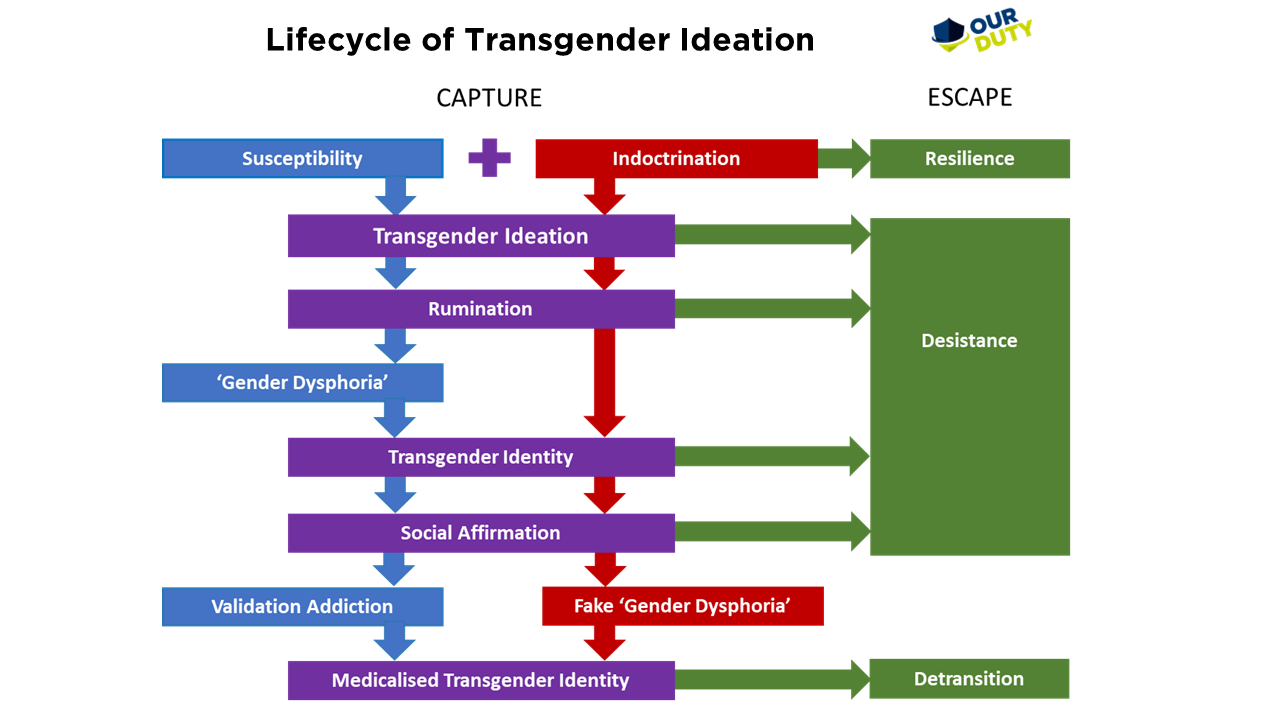Reframing the Debate: From ‘Gender Dysphoria’ to ‘Transgender Ideation’
Accuracy in language is important for safeguarding
The language we use to discuss complex social issues often shapes the policies and interventions designed to address them. Nowhere is this more evident than in the discourse surrounding transgender identification. Terms like "gender dysphoria" and "gender incongruence" have dominated discussions, reinforcing a medicalized view of transgender identification as a condition requiring treatment. Yet, these terms fail to capture the broader social and psychological realities at play.
Instead, policymakers should adopt the term “transgender ideation” to reflect the cultural, psychological, and ideological underpinnings of this phenomenon. Such a shift in language is critical for safeguarding vulnerable individuals, addressing systemic risks, and ensuring policies are rooted in evidence rather than ideology.
Beyond the Medicalized Framework
Terms like "gender dysphoria" frame the issue as a psychological distress rooted in a mismatch between one’s sex and “gender identity.” Similarly, "gender incongruence," now part of the World Health Organization’s classifications, further entrenches the idea that such distress is innate. These labels inevitably lead to a medicalized response: puberty blockers, cross-sex hormones, and even surgeries to “align” the body with an internal sense of self. Indeed, these terms were conceived to justify medical interventions.
Yet, this framework ignores the reality that transgender identification is often influenced by external factors. Social contagion, online subcultures, and peer reinforcement are well-documented contributors, particularly among adolescents. The term “transgender ideation” better reflects the belief-driven, ideological nature of such identification, drawing attention to its cultural and psychological roots rather than presuming it stems from an innate condition.
Why Language Matters
The language of “dysphoria” and “incongruence” has been co-opted to normalize gender identity ideology. These terms create a veneer of scientific legitimacy for treatments that remain highly experimental and poorly evidenced. The Cass Review, commissioned by NHS England, exposed serious deficiencies in the evidence base for puberty blockers and cross-sex hormones, particularly for young people. It called for extreme caution, emphasizing the lack of long-term data on outcomes and risks.
“Transgender ideation” shifts the focus away from medical solutions and encourages a more holistic approach. It invites scrutiny of the external factors—media, culture, and peer influence—that shape beliefs about gender. In doing so, it opens the door to interventions based on psychotherapy, family support, and critical thinking rather than medical intervention.
Implications for Safeguarding
Adopting the term "transgender ideation" would have profound implications for safeguarding children and young people. Adolescents often experience intense, transient beliefs about themselves. The term rapid-onset gender dysphoria (ROGD) came to common usage following a study by Lisa Littman in 2018. This showed that teenagers suddenly identify as transgender after exposure to online communities, and highlighted the role of social contagion.
Using "ideation" emphasizes the need to understand these influences rather than rushing to affirm a potentially fleeting belief. Policymakers must prioritize delaying irreversible interventions, providing psychological support, and addressing underlying mental health issues such as anxiety, depression, or trauma.
Rethinking Autonomy and Consent
One of the most contentious aspects of gender identity is the assumption that adolescents can meaningfully consent to treatments with lifelong consequences. The Cass Review cast doubt on whether minors can fully comprehend the risks of infertility, loss of sexual function, and long-term health complications associated with hormone treatments.
The concept of transgender ideation highlights the developmental immaturity of adolescent decision-making. Research into brain development suggests that the prefrontal cortex, which governs decision-making and impulse control, continues maturing into the mid-20s. This underscores the need for caution in endorsing adolescent choices about irreversible medical treatments.
The Role of Ideology
Framing the issue as “ideation” also exposes the ideological roots of transgender identification. The rapid rise in transgender identification—particularly among teenage girls—has coincided with a cultural shift toward affirming self-declared identities. Online platforms and activist groups often reinforce rigid ideas about gender stereotypes, encouraging young people to view discomfort with puberty or societal expectations as evidence they were “born in the wrong body.”
By challenging these ideological assumptions, policymakers can resist the normalization of medical interventions that fail to address underlying causes. Scrutinizing the role of ideology allows for a more balanced conversation about the social and cultural drivers of transgender identification.
A Call for Evidence-Based Policy
Transgender ideation as a concept moves the debate beyond medical interventions to focus on safeguarding, evidence, and the psychological wellbeing of individuals. It shifts the conversation from identity affirmation to addressing the broader context of why individuals—particularly adolescents—come to believe they are transgender.
Policymakers must resist the pressure to adopt language and frameworks that prioritize ideology over evidence. A shift in terminology can pave the way for policies that better serve individuals and society, focusing on truth, safeguarding, and long-term wellbeing.
By embracing precision in language, we can protect vulnerable individuals from harm and ensure that public policy reflects reality rather than ideological trends. In this critical area, the stakes are simply too high for anything less.
To fully understand the nature of transgender ideation in adolescents, please read The Lifecycle of Transgender Ideation on the Our Duty website.





“Ideation” is not as harsh as “delusion” which is more sharply focused, but it certainly pulls attention away from the pretending someone is unhappy with mystic gender. Kudos.
Yes, yes, yes!!! Finally- you put to words what my intuition could not. This is what SO many people who could help stop this madness are missing and do not understand. THERE IS MORE TO THIS IDEOLOGY THAN A SENSE OF KIDS JUST ‘knowing’ their ‘true’ selves! The culture around our kids is 💯% affecting their behavior, thoughts and decisions. Like all adolescents for thousands of years. Ugh. Why are some people so willing to NOT grasp this?? This article is great. I need to read it again and again.